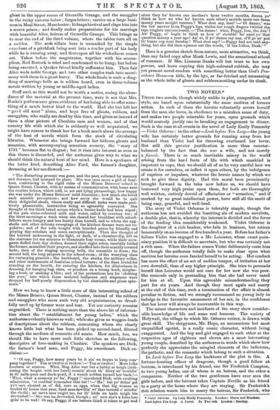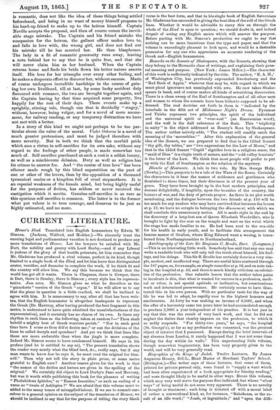TWONOVELS.*
THESE two novels, though widely unlike in plot, composition, and style, are based upon substantially the same motives of human action. In each of them the heroine voluntarily severs herself from the man she loves, in obedience to a mistaken sense of duty, and makes two people miserable for years, upon grounds which would scarcely justify one in breaking an engagement to dinner. Such is the case at all events in the novel of Lady Emily Ponsonby- - Violet Osborne : in the other—Look before You Leap—the young wife has certainly better grounds for running away from her husband than Violet had for throwing overboard her lover- But still this greater justification is more than counter- balanced by the fact that she was a wife, and not merely a fiancée. There is so much inevitable misery in the world arising from the hard facts of life with which mankind is impotent to cope, that we should all of us be very careful how we create it for ourselves, or inflict it upon others, by the indulgence of caprices or impulses, whatever the heroic names by which we seek to give them dignity. Had this moral been prominently brought forward in the tales now before us, we should have bestowed very high praise upon them, for both are thoroughly well written, entirely devoid of affectation or "sensation," and if marked by no great intellectual power, have still all the merit of being easy, graceful, and well-bred.
The story of Violet Osborne is tolerably simple, though the authoress has not avoided the besetting sin of modern novelists, a double plot, that is, whereby the interest is divided and the force of the leading idea considerably weakened. Violet Osborne is the daughter of a rich banker, who fails in business, but retires honourably on an income of five hundred a year. Before her father's failure Violet was engaged to a Mr. Leicester, whose exact pecu- niary position it is difficult to ascertain, but who was certainly not a rich man. When the failure comes Violet deliberately casts biro off, though the authoress totally fails to make clear upon what motives her heroine even fancied herself to be acting. Her conduct has more the effect of an act of sudden temper, of irritation at her own downfall, than of any higher principle. She tries to persuade herself that Leicester would not care for her now she was poor. She succeeds only in persuading him that she had never cared for him at all. Upon this agreeable misunderstanding they part for six years. And though they meet again and marry at the end of this time, such a termination of the affair is almost peculiar to fiction, and we strongly recommend no young lady to indulge in the favourite amusement of her sex, in the confidence that her lover will always be recoverable in this way.
The minor characters and incidents of the story show consider- able knowledge of life and some real humour. The society of Holywell, the village to which Mr. Osborne retires, is drawn with great skill. The clergyman, Mr. Hope, an unconscious but most unqualified egotist, is a really comic character, without being exaggerated. And the boy and girl engaged to each other at the respective ages of eighteen and eleven are a most interesting young couple, described by the authoress in words which show how perfectly she appreciates the mingled elements of the ludicrous, the pathetic, and the romantic which belong to such a situation. In Look before You Leap the backbone of the plot is this. A fortune-hunting officer of dragoons, though a good fellow at bottom, is introduced by his friend, one Sir Frederick Compton, to two young ladies, one of whom is an heiress, and the other a companion. Neither of the two gentlemen have ever seen the girls before, and the baronet takes Captain Neville as his friend to a party at the house where they are staying. Sir Frederick's rich relation wants him to marry the heiress, Sir Frederick, who
* Violet Osborne. By Lady Emily Ponsonby. London: Hunt and Blaokait. Look Wore You Leap. A Novel. In Two vols. London Bentley. is romantic, does not like the idea of these things being settled beforehand, and being in no want of money himself proposes to his hard-up friend to make up to the heiress himself. Captain Neville accepts the proposal, and then of course comes the inevit- able stage mistake. The Captain and his friend mistake the companion for the heiress, the gallant officer makes love to, and falls in love with, the wrong girl, and does not find out his mistake till he has married her. He then blasphemes. The lady in a fit of romantic generosity runs away, leaving a note behind her to say that he is quite free, and that she will never claim him as her husband. When the Captain returns home and finds his bride flown his better nature asserts itself. His love for her triumphs over every other feeling, and he makes a desperate effort to discover'her, without success. Marie of course undergoes incredible hardships in the course of gain- ing her own livelihood, till at last, by some lucky accident duly flavoured with romance, the two are brought together again, and the Captain having by that time acquired some property, live happily for the rest of their days. These events make up a sprightly, stirring tale, though one that is decidedly " stagey," without, however, being vulgar, and for a novel of mere amuse- ment, for railway reading, or any temporary distraction we have not met with a better.
In a story of this kind we ought not perhaps to be too par- ticular about the value of the moral. Violet Osborne is a novel of much greater pretensions, and must be judged therefore with more severity. But in both we think that the morbid pride which sees a virtue in self-sacrifice for its own sake, without any regard to the feelings of other people, is made somewhat too much of. Self-sacrifice purchased at such a cost is a selfish luxury, as well as a mischievous delusion. Duty as well as religion has its crimes to answer for. And "the course of true love" has been oftener made rough by this blind superstition on the part of one or other of the lovers, than by the opposition of a thousand -tyrannical uncles or a kingdom full of cruel stepmothers. It is an especial weakness of the female mind, but being highly useful for .the purposes of fiction, has seldom or never received the castigation which it merits. Genuine self-sacrifice is as rare as this spurious self-sacrifice is common. The latter is to the former what pot valour is to true courage, and deserves to be just as highly estimated, and no more.































 Previous page
Previous page